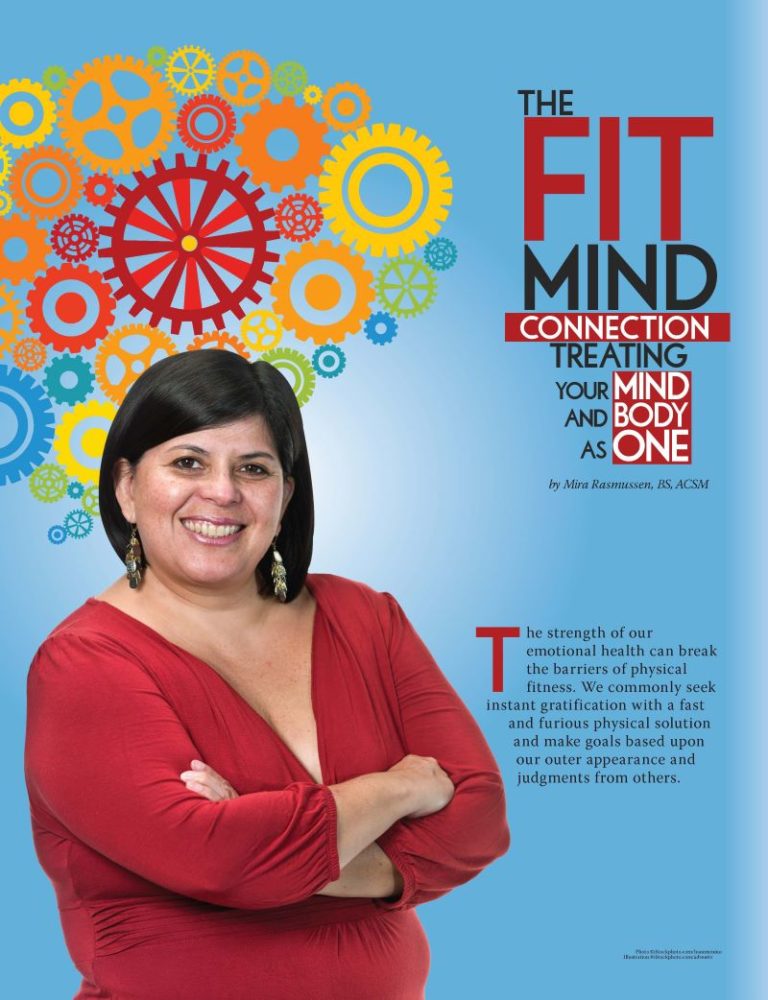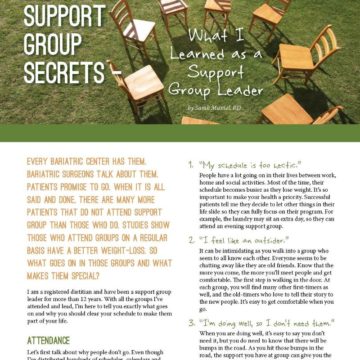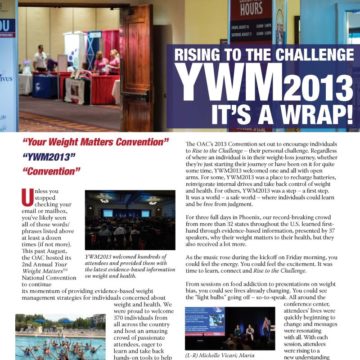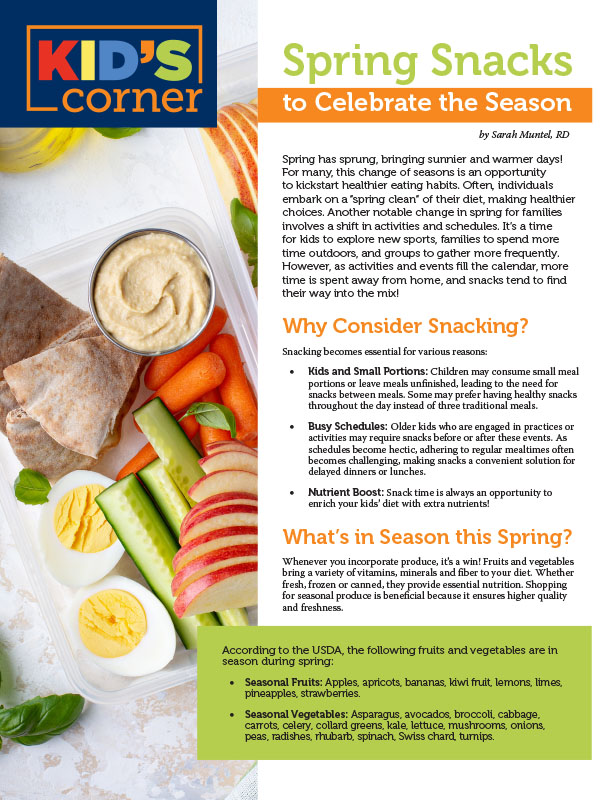The Fit Mind Connection: Treating Your Mind and Body as One


by Mira Rasmussen, BS, ACSM
Fall 2013
The strength of our emotional health can break the barriers of physical fitness. We commonly seek instant gratification with a fast and furious physical solution and make goals based upon our outer appearance and judgments from others.
Even if our goals are health-based, such as seeking relief from our physical aches and pains or yearning to lower our medications, we often rush the process. A familiar representation of this relates to weight-loss. In the urgency to lose weight, we tell ourselves that the most extreme diets and exercise regimens are doable because it’s only going to be for a short while. The problem here is that if you haven’t considered the fitness of your mind, any physical achievements will only last until your determination is overwhelmed by old habits and rationalizations. In order to truly transform yourself and make fitness a part of your lifestyle, the mind and body have to be treated for their specific needs and then exercised together.
Emotional and Physical Needs
All of us have a number of basic emotional and physical needs. Often, these needs are lacking due to the day-to-day stressors of life. When this occurs, we are susceptible to unhealthy coping behaviors; unconscious attempts to somehow satisfy or escape the stressful environment or situation. Some of these coping behaviors may be:
- Overeating
- Self-Medicating
- Avoiding Social Situations
We all use different methods to try and numb the reality that we don’t want to face. Unfortunately, these behaviors can ultimately lead to weight gain, depression and a cycle of failures instead of successes. Unhealthy habits can sneak up on you throughout time and before you know it, you are struggling with life-changing health issues like obesity, heart disease, depression or diabetes. Unless you can get a sense of how well the basic needs are being met in your life and address any deficits, your attempts of becoming healthier can often fail before they even start. To further understand, let’s examine how emotional and physical needs are interconnected.
The Connection
In order to satisfy your physical needs, you must incorporate a balance of regular exercise, healthy nutrition and adequate rest into your daily lives. Regular, sustained physical activity may help:
- Increase the function of the circulatory and respiratory systems
- Enhance overall metabolism
- Improve cognitive function
- Improve your immune system
- Increase strength
- Improve flexibility
- Improve balance
- Decrease stress
These are all critical in allowing you to physically do the things you want to do. When a person is fit, they feel better both physically and mentally.
Proper nutrition is also important as it fuels your body’s needs. Nutrition allows you to keep powering forward in a positive manner. The problem is that far too many people don’t put a lot of thought into the power of the food that fuels them. What I mean is, how will the food you’re eating compliment the goals you’re trying to accomplish? Is your food appropriately balanced across the three macronutrients of fat, protein and carbohydrates? Does it contain the micronutrients you need to keep your body running efficiently? Without the vitamins and minerals that come from a wide variety of plants and lean meats, your body is still going to crave the nutrients it’s missing and can lead to increased hunger.
The micronutrients in food send the signal to our brains telling us we’re full and if your diet isn’t richly plant based with vegetables and fruits, it will no doubt be lacking in these essential micronutrients. Finally, quality rest is equally important for the body as it allows for recovery and reenergize of the mind. Without a proper amount of rest, six to eight hours of uninterrupted sleep per night is recommended, our mood, metabolism and energy will be greatly affected. Insufficient rest can cause the body to crave carbohydrates as a quick fix for energy and those extra calories are usually stored as fat. Physical fitness, diet and rest are the physical needs our bodies have every day, but the other component is satisfying our emotional needs as well.
Basic Human Needs
The consequences from not meeting our physical needs are often easier to recognize than noticing what’s missing from our emotional needs. Inherent emotional needs have to be fulfilled. For some, these needs are not intentionally ignored, yet go unfulfilled because many of us are taught to bury our feelings. Or sometimes as a result of a traumatic experience, coping versus dealing with the emotional loss becomes the easiest strategy. When it comes to reaching a balanced and healthy lifestyle, coping can become a major barrier or obstacle to achievement. Only after we give our needs attention can we be ready for growth and change. Take a moment to examine the following list of basic human needs in relation to what is being fulfilled or unfulfilled in your life:
Friendship
The need for companionship, love, and emotional & physical intimacy
Attention
The need to give and receive regular quality contact from others
Community
A sense of belonging and feeling a part of something beyond yourself
Goals
A need for purpose and meaning in your life
Challenge and Creativity
A sense of stimulation from your environment
Status
A sense of competence and therefore self-worth
Control
A sense of stability in relationships, home-life and environment
Mind-Body Connection
Without regular nutrition, sleep and exercise your psychological state suffers considerably
Many of these basic needs can overlap or be fulfilled in various ways, and many of them can be experienced through a form of physical exercise. To successfully achieve and maintain fitness, you have to work through your emotional barriers.
Break the Cycle
Often, we try to separate the body and mind when viewing our progress with an exercise and nutrition program. If separated, we may not notice the rationalizations we make that ultimately sabotage our goals. Here are three common situations and some tools you can use to break the cycle of failures and increase your emotional successes:
1) Anytime you eat past full, you are filling an emotional need, not a physical one.
A common question is, “Can I make up for what I ate with more exercise?” If you are just looking at numbers this would seem to equal out just fine. However, this isn’t how the body works as a whole. Many times we overeat on foods that are not nutritionally sound or contain empty calories. Additionally, we might have the best intentions of burning those extra calories off through exercise, but most likely the best plans to compensate happen the next day or a few days later when the food has already been stored as fat. Essentially you’re making your body work harder.
People that compensate overeating with exercise have a harder time recovering from the exercise bouts and their everyday energy declines. From there, it’s easy to get into a vicious cycle where exercise becomes punishment for overeating and instead of changing your diet, you stop exercising. With any experience that has undesirable associations, we are likely to stop and eventually avoid the situation altogether.
2) If you overeat, take a look at the environment, feelings and circumstances in which it happened.
The sensation of hunger is one of the most rationalized physical needs. Society influences the rationale to eat when we celebrate, are in boredom, when we are sad, lonely, disappointed or in pain. Think of the stereotypical woman with a broken heart eating ice-cream or the doctor giving out a sucker after a child gets a shot. We associate our emotions with food, so it’s easy to be confused and, it is best to question your hunger when a situation comes up that we associate with eating. Stop and look at what you ate today and ask yourself if it contains the nutrients your body needs or did you consume those foods due to hunger for something else.
Emotional hunger comes on suddenly; physical hunger occurs gradually. When you are eating to fill a void that isn’t related to an empty stomach, you crave a specific food, such as pizza or ice cream, and only that food will meet your need. When you eat because you are actually hungry, you’re open to options. Emotional hunger feels like it needs to be satisfied instantly with the food you crave; physical hunger can wait. Even when you are full, if you’re eating to satisfy an emotional need, you’re more likely to keep eating. When you’re eating because you’re hungry, you’re more likely to stop when you’re full. Emotional eating can leave behind feelings of guilt; eating when you are physically hungry does not. If we work to examine our emotional needs and address them, emotional hunger and physical hunger become more distinct and easier to identify and thus manage.
3) Getting started with physical exercise itself can be overwhelming.
First, let me start with the fact that you don’t need to be extreme in order to accomplish your goals; this approach ultimately leads to inappropriate exercise techniques, lack of recovery time and injury. There are emotional consequences associated with starting too aggressively with an exercise program. When you push to extremes, you are more likely to go “all or nothing,” which easily leads to avoidance altogether. Fitness should be accomplished in a balanced manner that accommodates a mind-body connection. Exercise should begin with your current ability and slowly progress from there. Each week you’ll build your confidence and your strength. Exercise should be a positive experience that rejuvenates you mentally and physically. To do this, find a place to exercise that interests your mind through the surroundings, the people or both. For some people, a regular gym might fit, but for others, the outdoors, a supportive trainer or a group might meet this need better.
Having someone to be your guide and provide education with exercise will help you understand how the body works and help solidify your lifestyle change. Even if you’ve exercised in the past and did several different activities before, without the education and support, it may not have stuck with you. Knowledge and support empowers you to change your belief system about who you are and what you are capable of. For example, knowing how the body is fueled in relation to exercise is a great tool to have in your pocket! Fitness professionals can give you important tips like: If you are trying to lose weight and are working out extremely hard, you are defeating yourself. The more anaerobic you become while exercising, the less fat you burn for fuel. Also when you work out at high intensities, you’ll crave additional carbohydrates, essentially replacing the calories you just burned off. Not understanding this process may lead to many failed attempts and the belief that you simply don’t have what it takes to lose weight…but you do. Part of the journey to health is gaining the education of fitness and creating your support system.
Conclusion
To succeed in your health, weight-loss and fitness interventions, you first have to recognize both your physical and emotional needs. Once you give attention to your needs and begin to work toward emotional and physical health, together you can create and accomplish your goals. Education and support are vital pieces of fitness. Learn to treat your mind and body as one, and allow that mind-body connection to empower you to start and maintain a physical exercise program that becomes a lifestyle change and ultimately transforms you.
About the Author:
Mira Rasmussen, BS, ACSM, is an exercise physiologist and health professional. She is passionate about personalizing the path to wellness and being a guide through that life-changing process. She works with all populations and utilizes her psycho-physiological skills in eating disorder recovery, addiction, corporate wellness, personal training and nutrition. Mira has worked side-by- side with renowned dietitians, doctors and psycho-therapists using physical fitness as a vital tool for clients to reach and sustain a well-balanced life.
by Sarah Muntel, RD Spring 2024 Spring has sprung, bringing sunnier and warmer days! For many, this…
Read Articleby Yelena Kibasova Spring 2024 The fitness world is evolving, with new trends and innovations that promise…
Read Articleby Robyn Pashby, PhD Winter 2024 “No one is ever going to date you if you don’t…
Read Article









